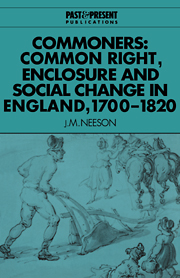Book contents
- Frontmatter
- Contents
- List of tables
- Preface
- Introduction
- 1 The question of value
- I SURVIVAL
- 2 Who had common right?
- 3 Threats before enclosure
- 4 Ordering the commons
- 5 Enforcing the orders
- 6 The uses of waste
- II DECLINE
- III CONCLUSION
- Appendix A Using the Land Tax
- Appendix B Acreage equivalents
- Appendix C Correcting and editing the Land Tax
- Appendix D Landholding estimates
- Bibliography
- Index
- Past and Present Publications
4 - Ordering the commons
Published online by Cambridge University Press: 01 February 2010
- Frontmatter
- Contents
- List of tables
- Preface
- Introduction
- 1 The question of value
- I SURVIVAL
- 2 Who had common right?
- 3 Threats before enclosure
- 4 Ordering the commons
- 5 Enforcing the orders
- 6 The uses of waste
- II DECLINE
- III CONCLUSION
- Appendix A Using the Land Tax
- Appendix B Acreage equivalents
- Appendix C Correcting and editing the Land Tax
- Appendix D Landholding estimates
- Bibliography
- Index
- Past and Present Publications
Summary
Many cottagers and occupiers had common grazing rights. But the very frequency of their entitlement raises the question of their value: did the right to pasture a cow survive because it was worthless, and, being worthless, was worth no one's time to extinguish? Were common pastures as bare and disease ridden as polemicists for a general enclosure Act, and some agrarian historians, have argued? Or were they as fertile as their defenders claimed, and even some enclosers admitted? An answer depends on how well common-field villagers cared for the common pastures. The balance they struck between the good upkeep of the pasture and its maximum use was crucial.
THE LAW OF THE COMMONS
Common pastures were useful only if they were not overstocked, and the animals fed on them prospered only if their grazing was well regulated and the risk of disease kept to a minimum. The upkeep and renewal of the pasture, the fencing and mounding of the fields, and the adoption of fodder crops as communal resources were operations decided upon and enforced by manorial courts and vestries. The by-laws or field orders ratified here regulated the working lives of more people, more often, than any other kind of law in common-field parishes. It involved more officers and more frequent enforcement too. It forbade abuse of the pasture, or use by those without rights, and it survived until all the fields and commons of a manor or a parish were enclosed.
- Type
- Chapter
- Information
- CommonersCommon Right, Enclosure and Social Change in England, 1700–1820, pp. 110 - 133Publisher: Cambridge University PressPrint publication year: 1993

